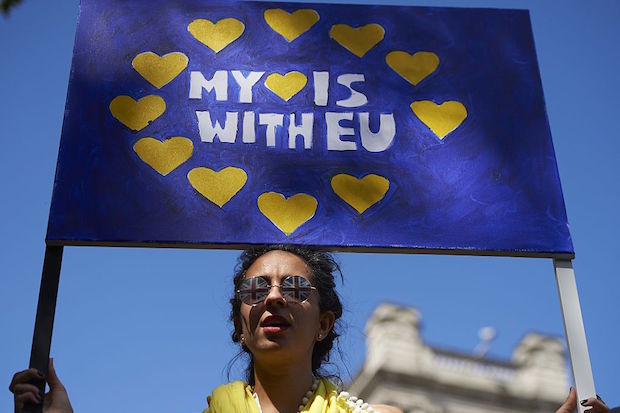Anyone who hasn’t been living in a cave for the past week or so will by now be growing increasingly tired of the repetitive and overly emotional responses of camp Remain. But what the visceral social media posts and pessimistic articles in the media have revealed is the genuine fear felt by many Remainers. These are people who are actually, and in some ways justifiably, terrified by the prospect of us leaving the EU.
However, at a debate hosted by Spiked and The Institute of Ideas, ‘Brexit: the battle for democracy starts here’ last week, I experienced first hand the other side of the coin. Many of the victorious Brexit-supporters, who you’d imagine to be elated by the referendum result, are in fact just as frightened as their opposite numbers.
After seeing support rise into the millions for the second referendum petition, and reading the plethora of articles desperately attempting to find a constitutional loophole that could save us from the eternal damnation of Brexit, these people are afraid. Afraid but defiant.
One of the most striking things was the palpable sense of anxiety – fear, even – that Brexit might not actually happen. Guest speaker Frank Furedi even went as far as saying that he didn’t think Brexit would end up happening. Instead, we’d most likely end up with a mild and moderated version of Brexit. This, he said, would constitute a failure, and more importantly, would be a betrayal of the democratic mandate placed upon the government by the people.
Furedi primarily saw Brexit as a positive – a once in a lifetime chance to free ourselves from the bureaucratic shackles of Brussels and reclaim our sovereignty. Yet he also warned that the opportunity for change could very easily be snatched away by enemies of democracy, or independence-orientated Scots. In response to these threats, he speculated about the formation of a pressure group, whose aim would be to make sure article 50 was invoked and that Britain fully left the EU.
Personally, I couldn’t immediately envisage the 200 or so people in the room taking to the streets, waving banners and shouting at the top of their lungs for Brexit. However, the audience surprised me, as when the discussion was opened up to the floor, there was an overwhelmingly strong feeling in the room that something had to be done. Many claimed that what’s needed is a real, physical presence, campaigning to ensure that Brexit and the peoples’ popular decision is fully realised.
Several others even went so far as to claim that a pressure group wasn’t enough. That something more was needed than exchanging emails and meeting up for a drink to brood about the state of the country, as was half-jokingly suggested by Furedi. It was obvious to me that these people wanted action, because they felt threatened. They were frustrated, scared and angry that their democratic rights as citizens were being dismissed, or even stolen from them.
What was being suggested as one step further on from a pressure group wasn’t quite clear. What was clear, however, were that hints of revolution were brewing. This seems, initially, quite bizarre; after all, Brexit won the referendum. But clearly many Leave voters don’t consider themselves as having won – at least not yet. There is a strong sense that the fight must go on. They may have won the first battle, but certainly not the war.
Given the intense media focus on the frustration of camp Remain, the anxiety felt by those who voted to leave the EU could easily go under the radar. It just goes to show how the division in society sparked by the referendum continues to divide opinions.
As tensions become increasingly flared and the political landscape of the country becomes more uncertain by the day, what we need is a strong, decisive and stable leader, who will recognise the importance of carrying out the mandate given to the government by the people. That is the only way we can possibly hope to regain stability and put an end to the deep, damaging division currently dominating the UK. Whether you voted Remain or Leave, this is surely a point we can all agree on.






Comments